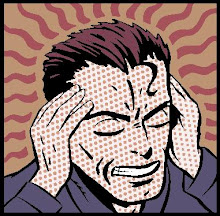Even with all these positive vibes, it's probably wise to start asking some questions.
Such as: is my wage going to stagnate? Is the value of my house going to plummet? Or just generally, are things going get a bit shit (not as much as I-really-need-to-do-runny-number-twos-and-the-only-option-is-to-go-on-the-ground-but-oh-no-its now-running-down-my-leg but a bit more than I'm-stuck-in-a-traffic-jam-and-really-need-to-wee-but-have-this-500mL-Sprite-bottle)?
And even more generally, am I more likely to get stabbed/bashed/held at knifepoint in the Safeway carpark at night? Are my best mates more likely to get a divorce? Are the hospitals going to be overflowing with sick people?
Aha. I can answer that last one. Sort of. (Not really.)
Christopher Rhum, a health economist in the US, has conducted a series of studies on economic growth and health. A few interesting findings.
1. Mortality tends to go down when the economy is in recession. Why? Good times bring about different deaths compared with bad times. Good time deaths = motor vehicle accidents, and heart disease. Bad time deaths = suicide. Cancer is not strongly correlated either way.
2. When the economy weakens, people clean up their acts by:
- smoking less;
- drinking less heavily; and
- exercising relatively more.
Interestingly, this result is borne out amongst the alcos, nicotine addicts and bariatrics (that's the nice sciency word for people who just can't say no to fried items out of a bain marie). Those of us who only fancy the odd tipple, a social puff and have just breached the threshold where they can no longer squeeze into their skinny jeans, are not likely to change their consumption patterns. But unclear whether this finding has accounted for relative income differences. If not, then probably not that exciting.
More here.













